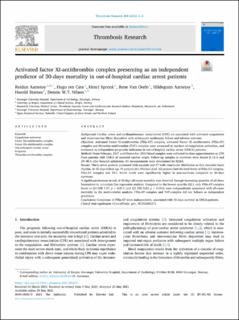Activated factor XI-antithrombin complex presenting as an independent predictor of 30-days mortality in out-of-hospital cardiac arrest patients
Aarsetøy, Reidun; ten Cate, Hugo; Spronk, Henri; Van Oerle, Rene; Aarsetøy, Hildegunn; Staines, Harry; Nilsen, Dennis W.T.
Journal article, Peer reviewed
Published version

Åpne
Permanent lenke
https://hdl.handle.net/11250/2991051Utgivelsesdato
2021Metadata
Vis full innførselSamlinger
- Department of Clinical Science [2295]
- Registrations from Cristin [9489]
Sammendrag
Background
Cardiac arrest and cardiopulmonary resuscitation (CPR) are associated with activated coagulation and microvascular fibrin deposition with subsequent multiorgan failure and adverse outcome.
Objectives
Activated Factor XI-antithrombin (FXIa-AT) complex, activated Factor IX–antithrombin (FIXa-AT) complex and thrombin-antithrombin (TAT) complex were measured as markers of coagulation activation, and evaluated as independent prognostic indicators in out-of-hospital cardiac arrest (OHCA) patients.
Methods
From February 2007 until December 2010 blood samples were collected in close approximation to CPR from patients with OHCA of assumed cardiac origin. Follow-up samples in survivors were drawn 8–12 h and 24–48 h after hospital admission. All measurements were determined by ELISA.
Results
Thirty-seven patients presented with asystole and 77 with ventricular fibrillation as first recorded heart rhythm. At 30-days follow-up, 70 patients (61.4%) had died. All patients had elevated levels of FXIa-AT complex, FIXa-AT complex and TAT. Initial levels were significantly higher in non-survivors compared to 30-days survivors.
A significant increase in risk of 30-days all-cause mortality was observed through increasing quartiles of all three biomarkers in univariate Cox regression analysis. Compared to the lowest quartile (Q1), only FXIa-AT complex levels in Q3 (HR 3.17, p = 0.011) and Q2 (HR 3.02, p = 0.016) were independently associated with all-cause mortality in the multivariable analysis. FIXa-AT complex and TAT-complex did not behave as independent predictors.
Conclusions
Complexes of FXIa-AT were independently associated with 30-days survival in OHCA-patients.
